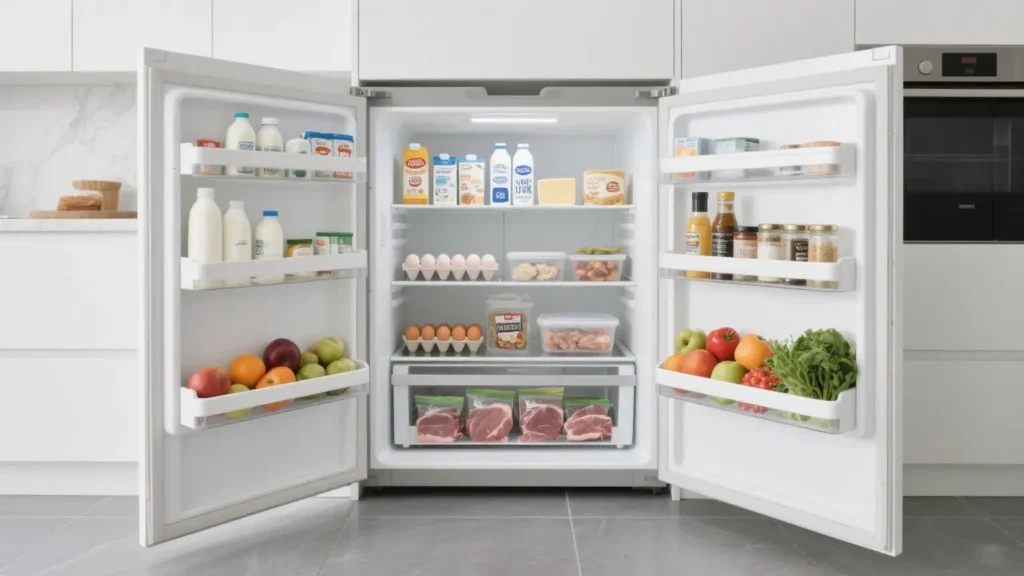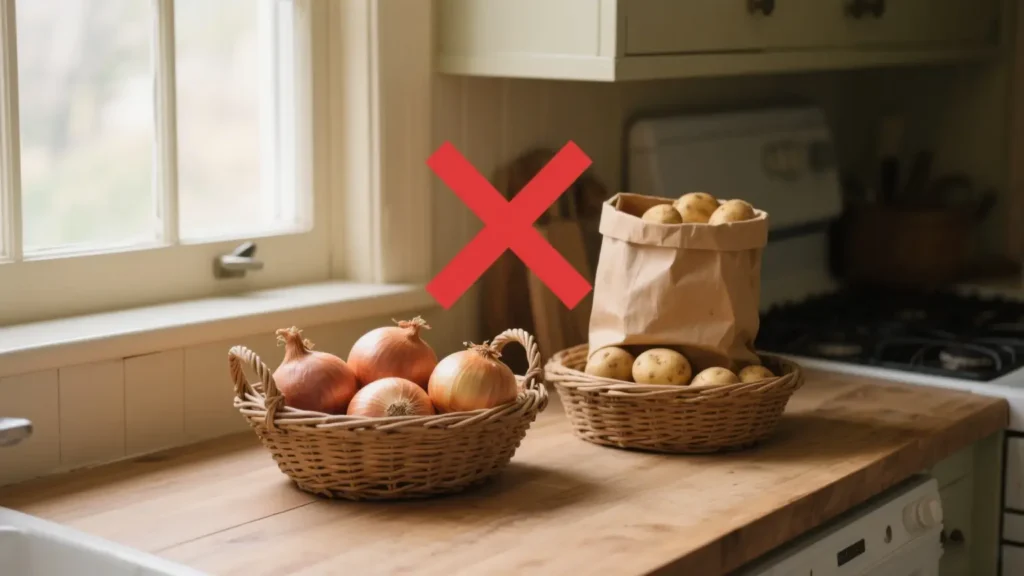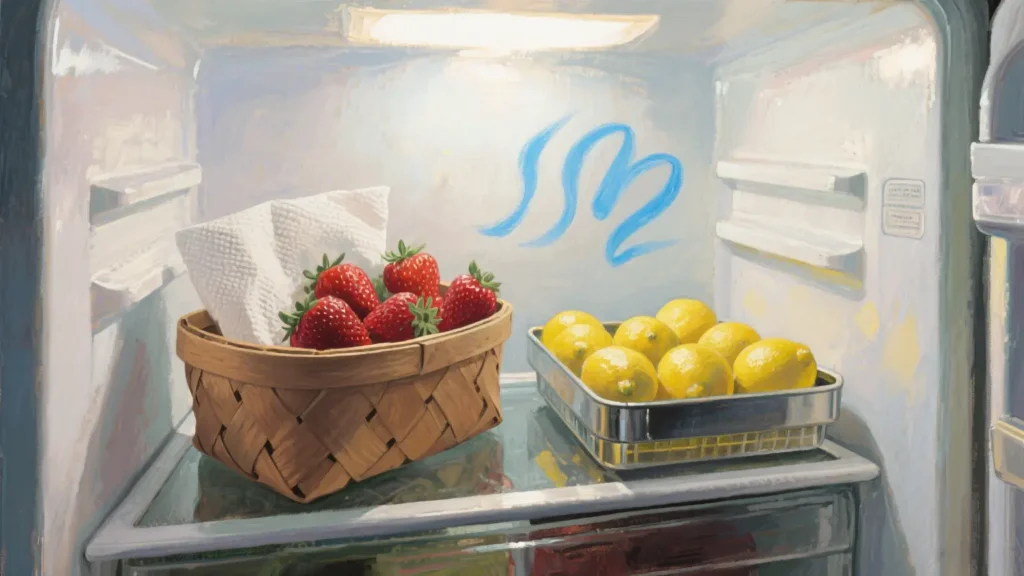The automatic assumption of many people is that the refrigerator is the food that is always fresh. Once placed in the refrigerator, there is a perception that it will remain safe and last longer. The truth is, not all foods can be stored together, even in the fridge.
Wrong storage, leading to unexpected taste, and premature spoilage are the reasons for bad odors and also foods getting wasted. If you have ever observed that your salad leaves became droopy very fast or that the skin of your cucumbers became so soft, you could be keeping the wrong items next to each other.
Here is a detailed discussion of the foods that should never be kept together in the refrigerator, why food storage blunders occur and how to smartly manage your refrigerator

Understanding the Science of Fridge Storage
The basics behind safe and efficient fridge storage consist in understanding the nature of different types of food. Some fruits release gases that make other produce mature faster. Others are very susceptible to moisture and warmth, or ethylene gas changes. The resulting mixture can trigger premature spoilage, bad taste, or contamination by bacteria.
There are three issues that are frequently caused by poor food arrangement:
- Ethylene gas emission: Certain fruits release ethylene, a ripening hormone that can quickly spoil ethylene-sensitive vegetables.
- Cross-contamination: Raw meat can leak juices, contaminating nearby ready-to-eat items.
- Food or some of its components that have a strong smell, like onions or garlic, could mean that this smell will transfer to cheese, butter, or dairy products.
If you are familiar with the foods that don’t have good chemistry and the ones that do, you will save a good portion of your food, protect the flavor, and, finally, make your food safer through lower temperatures.
1. Apples and Leafy Greens
Apples produce gas that helps in their ripening, and this gas also causes destruction to ethylene-sensitive vegetables like lettuce, spinach, and kale. When apples and leafy greens are close together, the former cause the latter to become yellow, wither, and rot quickly.
What should be done: Keep apples in a separate drawer when not in use or take them out of the fridge and put them on any flat surface if you plan to eat them soon. Store greens in a crisper drawer, and for its long service, keep it in the special bags that regulate the moisture of the products.
2. Bananas and Avocados
Bananas are the fruit that releases the largest amount of ethylene gas, and it is also the one that speeds up the ripening of the other fruits, in this case, avocados. Nevertheless, while such a setup can be beneficial if one desires an avocado to ripen quickly, yet this practice over an extended period only results in mushy, overripe fruit.
Storage suggestion: Keep bananas outdoors at an ambient temperature. Avocados should be left on the counter until they ripen fully, after which, if you desire, you can keep those in the fridge separately to slow down the ripening process.
3. Onions and Potatoes
It is a common mistake to put onions and potatoes together in the same box in the kitchen. The trouble is that onions emit gases and moisture to cause the potatoes to sprout and decay faster. Meanwhile, potatoes could also absorb and smell the strong taste of the onion.
Another way is to store onions in a dry, well-ventilated area where they are free from light. For the best preservation, potatoes are to be kept in a dark, cool place or a well-ventilation paper bag, ideally in a different area, the kitchen, and not the fridge, where they turn starchy and lose flavor.

4. Raw Meat and Ready-to-Eat Foods
Uncooked animal products, mainly meats, are one of the main factors that alongside salmonella and E. coli lead to food poisoning. If they come in contact with food in the fridge, these can transfer the contaminations to others and especially such food as produce, leftovers, and dairy are not spared any risk.
To prevent food poison:
- Make sure beef, lamb, pork, or poultry are always placed in leak-proof containers.
- Vegetables should not get soaked under the leaking meat, hence, your option of the bottom shelf of the fridge is the most convenient.
- Do not keep raw meat and other foods next to it in the same compartment, let alone cooked food or produce, if there is sufficient space, it is just a question of getting used to a new way of storing food.
5. Cheese and Pungent Foods
Cheese is quick to absorb the smells of the environment, especially those that contain plenty of fat like the cheese itself. If in the vicinity of very odorous and pungent food, such as onions, garlic, strong leftovers, and Chesapeake sauces, then the cheese will start to develop bad taste and smell and, therefore, will be unsuitable for consumption.
What to do: Cheese should have a designated drawer in the refrigerator to be separated from the rest of the food. Or, an alternative could be putting fragile cheeses in bags that you have first wrapped in waxed paper.
6. Tomatoes and Cucumbers
Both tomatoes and cucumbers are always kept in the refrigerator, but they don’t make the list of the best food combinations for storing in the fridge. Even if the weather is hot, the tomatoes that you store in your refrigerator will still go on producing the gas ethylene, and the cucumbers, on the other hand, do not like the idea of the soft spots that the gas will make them have that could rot them hastily. Furthermore, cherry tomatoes and other very small tomatoes no longer have a perfect taste after they are kept in cold.
Best Ways of Preservation: Put tomatoes where they can get some light from the sun, away from heat sources. Ideally, store cucumbers in a well-insulated place like the fridge crisper drawer, but this time take them out of the wrapping but use dry paper to wrap them.
7. Berries and Citrus Fruits
Berries such as strawberries and blueberries have a very short shelf life and are susceptible to mold. Putting them with high-moisture fruits such as oranges and lemons in the fridge will create a humid environment that promotes mold growth and the fruits will change quickly.
Storage solution: Dry out the berries with paper towels inside the open containers. Put separately lemons and oranges in a drawer of the fridge or store them on the counter, and they will keep fresh for seven days.
Fridge Zones Significance
The layout of your refrigerator is essential to keeping food fresh. Refrigerator compartments have different temperatures and levels of humidity and are suitable for different types of food items.
Here is a brief guide on the allocation of food products:
- Top shelves: It is advisable to keep ready-to-eat items such as leftovers, dairy, and drinks on these shelves as they are the places in the fridge with no temperature fluctuations.
- Middle shelves: Eggs, cold cuts, and packaged foods. Use the middle area for products that need consistent cooling.
- Bottom shelf: Raw meat, poultry, and seafood–always in containers that are sealed well.
- Crisper drawers: Vegetables and fruits. Each drawer should be designated for a specific product (for example, one for low-ethylene produce such as greens, and carrots, and the other one for ethylene-releasing fruits such as apples, and pears).
- Fridge door: Keep condiments, juices, and items that are less affected by temperature changes on this part of the refrigerator.
Do not put too many things in the refrigerator.
General Rules for Spoilage Prevention
Now that you have learned what to avoid when it comes to food storage, here are a few additional experts’ tips for longer-lasting food:
- Employ clear, labeled containers: This is the best way to visualize, and keep track of the things you have and avoid the forgotten ones to spoil.
- With wet paper towels as blankets, herbs can be placed in resealable bags to keep them fresh for a longer time.
- It is better not to wash fruits and vegetables before storing as dampness happens to be one of the triggers for spoilage of the products and the requirement of such.
- Classify by type: Maintain a clear division of products, e.g., fruit, vegetables, dairy products, and meat, storing them in the separate areas.
- Periodically clean your fridge: Spillages and out-of-date products can affect the freshness of food.
- Baking soda and activated charcoal are two odor neutralizers that can help you maintain a clean-scented fridge.

Conclusion: Smarter Storage Means Less Waste
Knowing which foods should never be stored together in the refrigerator is mainly focused on being more comfortable, but it also cut back on a significant amount of food waste, the maintenance of good taste and the safety of food. Waste of food can be reduced, and money can be saved if one stays in control of the refrigerator and uses technology to this end.
Take some time to examine the content of your fridge. Are your green leaves in contact with the apples? Have you placed your raw meat right next to your yogurt? With just a few simple rearrangements, your refrigerator’s efficiency will have gone up remarkably- not to mention the longevity of your food.
It is a matter of fact that in food storage, the separation of items that emit gas with those that are sensitive to such gas is as important as the temperature at which they are stored.
Frequently Asked Questions (FAQs)
Q: In the fridge, can I keep apples along with other fruits?
A: Apples produce ethylene gas that can speed up the ripening of other fruits and vegetables. It is always better to store them separately, especially from leafy greens and cucumbers.
Q: Why shouldn’t onions and potatoes be stored together? A: Onions release moisture and gases that cause potatoes to sprout and rot faster. Keep them in separate, well-ventilated areas outside the fridge.
Q: Should tomatoes be stored in the fridge? A: Not really. In a refrigerator, tomatoes can lose their flavor and become soggy. Keep them at room temperature unless they are really ripe.
Q: Can I store raw meat above vegetables in the fridge? A: Never. Meat that is not cooked should be at the bottom of the fridge to avoid any liquids that may contaminate the vegetables or the ready-to-eat products.
Q: How do I keep herbs fresh in the fridge? A: First, place the herbs in a slightly wet paper towel and then put them in a resealable bag or in a container with a tight-fitting lid. This way, herbs don’t dry out and their freshness is extended.